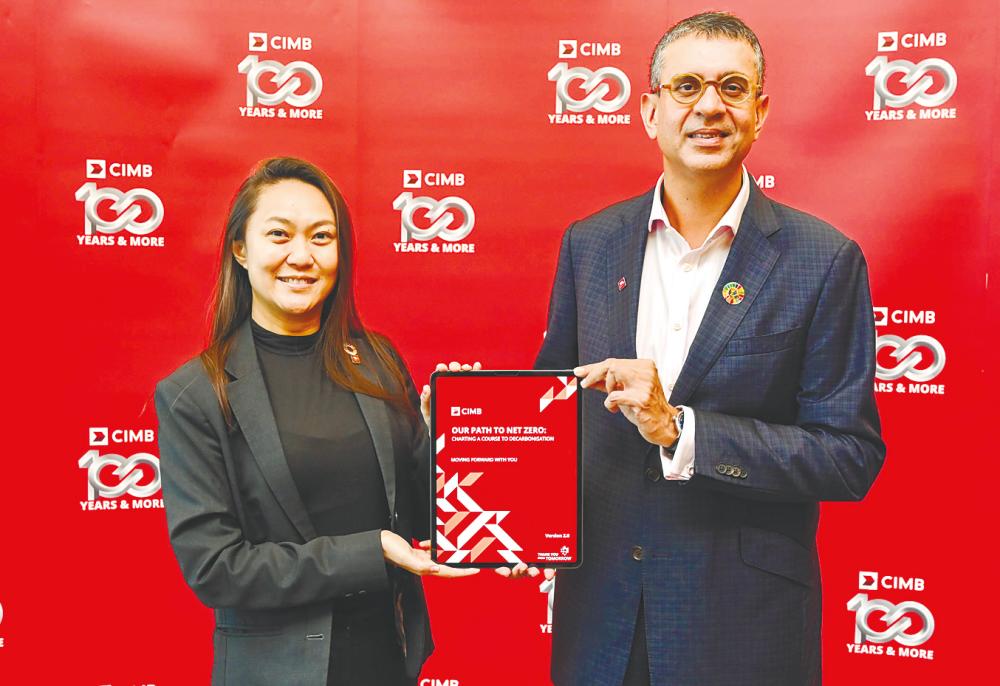PETALING JAYA: CIMB Group Holdings Bhd is the first Malaysian bank to complete setting 2030 decarbonisation targets for high-emitting sectors in pursuit of its broader 2050 net zero commitments, which include thermal coal mining, cement, palm oil and power,
The group announced its 2030 climate targets for its oil and gas and real estate portfolios i Kuala Lumpur today.
It has updated its previously published white paper detailing its decarbonisation plans, delineating sector-specific pathways and immediate strategies for all six sectors, which collectively account for 60% of the group’s financing portfolio emissions as of 2023.
CIMB Malaysia and CIMB Bank Bhd CEO Gurdip Singh Sidhu said, “We are pleased to announce the completion of CIMB’s 2030 decarbonisation targets, marking a significant milestone toward realising our long-term net zero target by 2050. These interim targets demonstrate our accountability and reinforce our commitment to facilitating a just transition across Asean.
“By breaking down our long-term goal into actionable and measurable milestones, we are paving the way for tangible progress. While we implement proactive measures to address climate risks in our portfolio and promote sustainable finance practices, CIMB remains committed to support and empower our clients in transitioning to more sustainable business practices.”
Gurdip, who also oversees the group’s overall sustainability efforts, added that CIMB’s sector-specific decarbonisation plans are carefully tailored to closely align with the respective government policies and directives of each country, demonstrating its dedication to advancing national objectives across the regions it operates in.
CIMB said it is committed to assisting its oil and gas clients as they decarbonise and shift towards renewable and low-carbon alternatives in their portfolios. To that end, CIMB aims to facilitate the transition by reducing Financed Emissions Lending Intensity of its oil and gas portfolio by 16% by 2030. This target encompasses Scope 1, 2 and 3 emissions originating from pure-play upstream exploration and production companies as well as integrated oil and gas players.
The decarbonisation target is set based on the International Energy Agency Net Zero Emissions by 2050 Scenario, enhanced with insights from the International Energy Agency Sustainable Development Scenario, to formulate a net zero scenario appropriate for the Asean context.
Concurrently, starting Jan 1, 2025, the group will cease new financing specifically for new upstream oil fields approved for development post-2021. However, acknowledging the pivotal role of natural gas as a transition fuel needed by Asean, CIMB will continue to support natural gas initiatives. This is especially crucial in reducing dependence on coal within the power sector and ensuring energy security through self-sufficiency in the short term.
The group has set a target to reduce the operational emissions intensity of its commercial real estate portfolio by 34% by 2030. This interim target, which comprises its real estate clients’ Scope 1 and 2 emissions are set in line with improvements in energy efficiency implied by the Carbon Risk Real Estate Monitorbut adopts a power grid decarbonisation rate in line with the IEA Announced Pledges Scenario pathway.
To meet this target, CIMB will actively seek to finance the development, retrofitting and
maintenance of more energy-efficient buildings including energy transitions in buildings through onsite renewable energy installations such as rooftop solar PV and energy storage. In 2021, CIMB was the first bank amongst emerging markets globally to announce its commitment to exit coal by 2040, in line with the goals of the Paris Agreement and most recently, the first bank globally to announce a net zero decarbonisation pathway for its palm oil portfolio.









